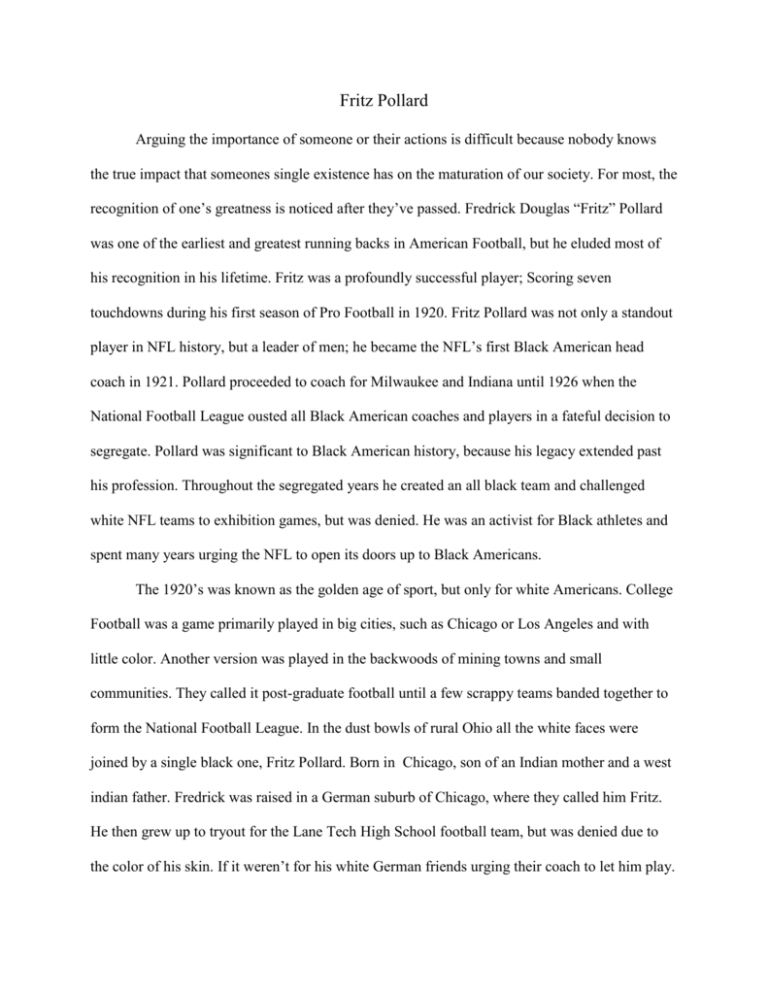Fritz Pollard Arguing the importance of someone or their actions is
advertisement

Fritz Pollard Arguing the importance of someone or their actions is difficult because nobody knows the true impact that someones single existence has on the maturation of our society. For most, the recognition of one’s greatness is noticed after they’ve passed. Fredrick Douglas “Fritz” Pollard was one of the earliest and greatest running backs in American Football, but he eluded most of his recognition in his lifetime. Fritz was a profoundly successful player; Scoring seven touchdowns during his first season of Pro Football in 1920. Fritz Pollard was not only a standout player in NFL history, but a leader of men; he became the NFL’s first Black American head coach in 1921. Pollard proceeded to coach for Milwaukee and Indiana until 1926 when the National Football League ousted all Black American coaches and players in a fateful decision to segregate. Pollard was significant to Black American history, because his legacy extended past his profession. Throughout the segregated years he created an all black team and challenged white NFL teams to exhibition games, but was denied. He was an activist for Black athletes and spent many years urging the NFL to open its doors up to Black Americans. The 1920’s was known as the golden age of sport, but only for white Americans. College Football was a game primarily played in big cities, such as Chicago or Los Angeles and with little color. Another version was played in the backwoods of mining towns and small communities. They called it post-graduate football until a few scrappy teams banded together to form the National Football League. In the dust bowls of rural Ohio all the white faces were joined by a single black one, Fritz Pollard. Born in Chicago, son of an Indian mother and a west indian father. Fredrick was raised in a German suburb of Chicago, where they called him Fritz. He then grew up to tryout for the Lane Tech High School football team, but was denied due to the color of his skin. If it weren’t for his white German friends urging their coach to let him play. this story would be short; but thankfully he was allowed to play Defensive End at just 80 lbs. Fritz also played track and baseball at the school, but excelled at football. He gained 60 lbs in four years exceeding the expectations of those around him. Quotes “Fritz Pollard was a pioneer, a man who excelled not only because of his magnificent athletic gifts, but also because of his wits, intelligence and ability to lead and inspire people,” said Floyd A. Keith, executive director of the Black Coaches Association. “Those qualities and his persistence against very long odds capture the very essence of the BCA’s annual male coach of the year award in all aspects.” “As easy to catch as a bolt of lightning and as easily held,” Fritz Pollard was a standout halfback on Brown’s 1916 Rose Bowl team. He later became the first African American NFL coach. Other Info Taken from Pollard Foundation Website - “Fritz” Pollard grew up in Chicago. By the time he graduated from high school, he was a talented baseball player, running back and a three-time Cook County track champion. He briefly played football for Northwestern, Harvard and Dartmouth before receiving a scholarship from the Rockefeller family to attend Brown University in 1915. - Pollard led his squad to the 1915 Rose Bowl game. He was the first African American to play in the Rose Bowl, and the second to be named an All-American in college football. After leaving Brown, Pollard briefly pursued a degree in dentistry, worked as director of an army YMCA, and coached football at Lincoln University. - Pollard played for the Akron Pros. He lead the team to the first NFL Championship in 1920. - The NFL ban on players of color started to lift in 1946 after World War II ended, but not all teams were integrated until Bobby Mitchell joined the Washington Redskins in 1962. Works Cited "Fritz Pollard." Wikipedia. Wikimedia Foundation, 19 Oct. 2013. Web. 20 Oct. 2013. http://en.wikipedia.org/wiki/Fritz_Pollard "Fritzpollard.org." Fritzpollardorg RSS. N.p., n.d. Web. 20 Oct. 2013. http://fritzpollard.org/in-memoriam/fritz-pollard/ Coyle, Daniel. "03-078 (Fritz Pollard Award)." 03-078 (Fritz Pollard Award). Sports Illustrated, December 15, 2003, n.d. Web. 19 Oct. 2013 http://brown.edu/Administration/News_Bureau/2003-04/03-078.html "Brown University Sports Foundation." BROWN UNIVERSITY SPORTS FOUNDATION WEBSITE. Brown Bear Magazine., Dec.-Jan. 2009. Web. 19 Oct. 2013. http://sportsfoundation.brown.edu/archives/09Veterans.html Ross, Charles K. "LCC Library: Remote Access Authentication." LCC Library: Remote Access Authentication. New York University Press., n.d. Web. 19 Oct. 2013.Published 1999 (eBook) http://0-site.ebrary.com.library.lanecc.edu/lib/lanecc/docDetail.action?docID=10032511 Writing Frame Form Just like a picture hung on the wall looks the best when it is displayed in a frame that “fits” the picture, so too is writing at its best when it is written to fit inside its “frame.” The “frame” for writing consists of elements of the rhetorical/writing situation—your audience, your purpose, the genre in which you’re writing, and the time period in which you’re writing. These four elements compose a “frame” that allow you to craft the most effective piece of writing possible for the particular rhetorical/writing situation which you are attempting to address. For each piece you write in this class you will be asked to identify the “frame” in which you’re writing. Answer the following questions: 1. Who is your audience—in other words, whom are you trying to write to? Be SPECIFIC! Don’t just say “general audience.” The uninformed average student is whom I’m writing to. As well as peers, fellow football fans and the academics. I want my paper to be well versed, but relatable. Anybody should be able to read my paper and understand why Fritz Pollard was important to the sports world as well as the civil rights movement. Most of the people in my audience will not have extensive knowledge of the game of Football. So it’s vitally important that I set parameters so that my readers form both sides of the spectrum of knowledge can understand my thesis and the importance of Fritz Pollard. 2. What is your purpose—in other words, what effect do you want to have on your reader. Again, be SPECIFIC! What is the thing you want your reader to leave your writing with? My purpose is to enlighten people with knowledge pertaining to Fritz pollard. I had no Idea how great of an impact Fritz Pollard had being the first black head coach in football. He was a savant on the field. I also want to communicate that his legacy does not lie solely with the game of football. He was an academic, studying at brown university as well as a part of our armed forces. 3. What genre are you writing in? What are some of the conventions of this genre that might be important to consider as you begin your writing process? I think I’m writing an argumentative/narrative paper. Some conventions that are important to narrative and argumentative works are effective argument and trying to play a little devils advocate by keeping a level head and trying to understand the oppressiveness of society. 4. How is your topic relevant to your chosen audience NOW in the time frame in which you’re writing? It’s important to our audience now because there have only been 21 black American coaches in the NFL’s history. There are more that that many white coaches in the league right now. There may still be a stigma that goes along with a black coach in the NFL, but with so many black players in the league the number of black coaches can only go up. It’s relevant because it shows how scarce black leadership is in sports. There are many black players, but not many black owners, presidents, GMs and coaches.








